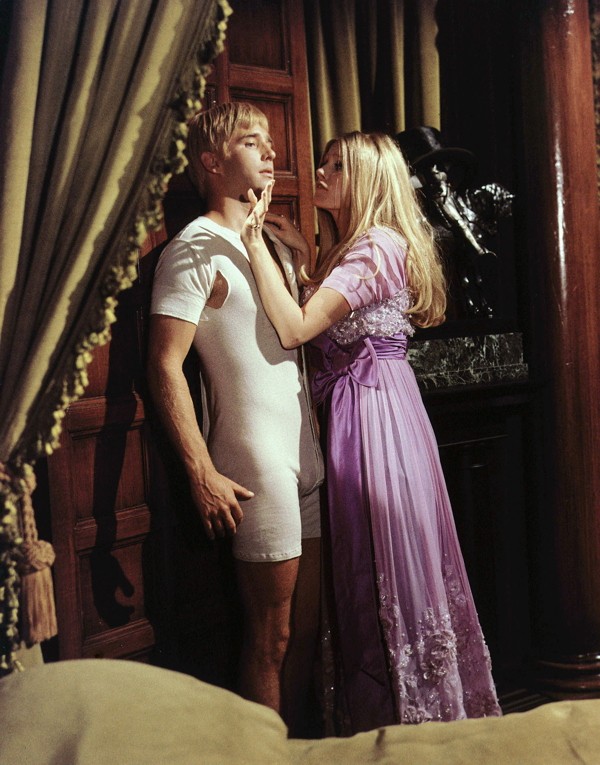Friday, March 20, 1970.
GAILY, GAILY. Written by Abram S. Ginnes based on a novel by Ben Hecht. Music by Henry Mancini. Produced and directed by Norman Jewison.NORMAN JEWISON IS a director who delights in subtle touches. Toward the end of Gaily, Gaily he has an anarchist daub a brick wall with the slogan "down with critics!"
Perhaps the screen-filling graffiti is Jewison's rejoinder to the critical drubbing taken by his The Thomas Crown Affair (1968), a flashy. vacuous film that invited attacks.
Gaily, Gaily, a thoroughly engaging movie, should have no such problems. With it, Jewison, a CBC-TV alumnus, asserts himself as one of Hollywood's most potent double-threat artists.
Playing the difficult dual role of producer-director on his last four projects, Jewison proves himself a superbly capable craftsman. Until now, however, he has had an irrepressible urge to make "meaningful" movies. With The Russians Are Coming, The Russians Are Coming (1966), he narrowly missed a Nobel Peace Prize. In the Heat of the Night (1969) won the Best Picture Oscar. Then The Thomas Crown Affair laid an egg.
With Gaily, Gaily Jewison returns to the comedy milieu, adapting the late Ben Hecht's imaginative reminiscences of pre-First World War Chicago.
The film's hero, Ben Harvey (Beau Bridges), is a small-town boy with growing pains. As captain of the high school gym team, he is top man on a human pyramid formed for the community's Fourth of July picnic.
Momentarily distracted by his bird's-eye view of some particularly attractive decolletage, he falls from his perch and is knocked cold. He awakens knowing that he has lapsed from his strict upbringing and that he must now make his way to the Big City to seek Truth.
For Ben, an innocent abroad, the road to Truth will be littered with shattered illusions. The first person he meets in Chicago picks his pocket, leaving him penniless and hungry. He is taken in by kindly Queen Lil (Melina Mercouri), only to find that his landlady is a notorious madam and her boarding house a bordello.
An aspiring writer, Ben is given a job assisting ace reporter Francis Sullivan (Brian Keith), who turns out to be a hard-drinking yellow journalist. Soon, he is ready to join the rioting anarchist and daub his own slogan on the wall: "Down with innocence!"
Jewison's own message emerges during some frantic moments of street fighting. "Are you for truth and decency?" a fleeing demonstrator asks Ben. "Are you for love and peace? Are you against corruption?"
"Yes! Yes! Yes!" answers Ben, keeping pace.
"Then keep running!"
True to his own advice, Jewison keeps his movie running from beginning to end. Together with cinematographer Richard Kline, he develops the period Chicago setting, America's second city and the world's largest small town.
Set against their muted-colour world are his blustering, full-blooded characters. Jewison is a tough-minded director with a sure comic touch, and his disciplined cast bring even the most outrageous of them to believable screen life.
Major contributions are made by Canadians Hume Cronyn, as machine politician "Honest" Tim Grogan, and Margot Kidder, making her big screen debut as Ben's sullied heartthrob Adeline.
But the movie's bounding pace is mainly due to the incredible, decaying innocence of youngster Bridges and the brawling brogue of veteran actor Keith. Playing amidst Jewison's inspiring touches, they carry off a real crowd-pleaser of a film.
NOTE TO ODEON'S ADVERTISING DEPARTMENT: One of your current radio spots tells us that young Ben is "on the loose in wild, prohibition Chicago." Not quite. The XVIIIth (prohibition) Amendment to the U.S. Constitution went into effect in January, 1920, and was repealed by Christmas, 1933. The gin-soaked Chicago of Gaily, Gaily is set circa 1910 and predates the First World War. Honest.
The above is a restored version of a Vancouver Express review by Michael Walsh originally published in 1970. For additional information on this archived material, please visit my FAQ.
AFTERWORD: Among my favourite Norman Jewison features, Gaily, Gaily includes a memorable moment when Beau Bridges, as cub reporter Ben Harvey, gets a lesson in the basics of big city journalism. Noting the young man's bewilderment on first hearing the term "sex maniac," his editor backs him across the city room, raising his voice so that everyone can hear. "And, Harvey, since you don't know what a sex maniac does, I will tell you. A good sex maniac SELLS NEWSPAPERS! "
